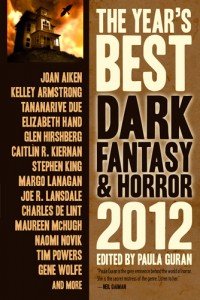 An Interview by Stacey Friedberg
An Interview by Stacey Friedberg
“Walls of Paper, Soft as Skin” by Adam Callaway will be appearing in Prime’s forthcoming Year’s Best Dark Fantasy & Horror: 2012 edited by Paula Guran. Pre-order here!
This is definitely a story that benefits from multiple reads – it seems like there are tiny details everywhere, just waiting to be discovered. How do you decide what things you want to include about this world?
I think short stories should have an intensely limited focus. In “Walls of Paper, Soft as Skin” I tried to distill the essence of Lacuna down to a thousand words. Originally, it ran well over three thousand, but I’m a proponent of heavy, unforgiving editing. I purposely made the story difficult, cutting away extraneous information. The length also invites rereading, so I dropped clues and hints that would be missed if you only read it once. Stories that force you to look at the details and go back over and over again have always been my favorite. I mean, I learned to write from reading Bradbury, Ellison, and Wolfe. They are masters of making you work to understand, and not because the stories lack clarity, but because the answers are poltergeists, hiding behind metaphors and dialogue, waiting for you to trap them.
Everything here hints at something larger – the unspoken relationship between Tomai and the girl, the giant termite that consumes the world’s wood supply, even Kork’s special pole. How much of this world exists in your head beyond this story, and how did you come up with it all?
Lacuna is a strange beast. I fancy myself a bit of a worldbuilder. It takes me a solid week to plan out a new world, meticulously sketing out fauna, religion, planetary physics, and what have you. With Lacuna, I come up with a character and explore the city through their eyes. In essence, I know nothing more about the city than the readers do.
Lacuna is also a reactionary city. A few years ago, I read Walter Moers’s The City of Dreaming Books, and China Mieville’s Perdido Street Station. They were two of the most wildly imaginative works of fiction I had ever read. I wanted to create my own Bookholm (the main setting in Moers’s novel), but with the trashheap chic feel of New Crobuzon. The early Lacuna stories were all obsessed with writing and writers, but as I wrote, I thought about what goes into all these books we love. Papermaking on a large scale is a brutal, dangerous process, and when you combine that with the dirty underworld that is lampblack creation, I had the grimy, industrial setting I needed to tell my stories.
That the paper here is made of human skin implies that in this world, paper is something to be valued and treasured. Each page has – or once had – a voice. What do you think this says about our society today, that we view so much as disposable?
Lacuna is alive in many ways. It’s a city that metabolizes everything that is within it. When something is thrown away, it is recycled, repurposed. Pages from rejected manuscripts are bleached and sold as loose leaf. Soot is turned into cheap ink.
It wasn’t meant to be a reflection on modern society – I never write to a specific theme, preferring to let them arise naturally. I write stories, that’s all. But I can see how it does play off of it.
It would be ignorant to say that we don’t live in a society of excess. With new gadgets and gizmos appearing everyday, the time of heirlooms is past. Not so in Lacuna. The heritage of the words written before runs deep into its catacombs. Languages never die, but slumber. Books are never lost, but misplaced. The new doesn’t replace the old, but walks arm-in-arm down the street with her.